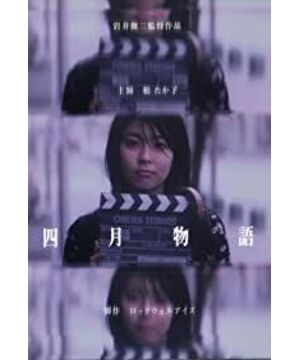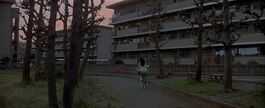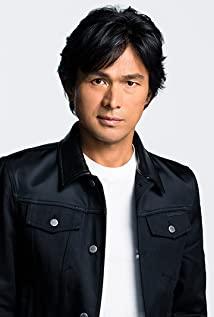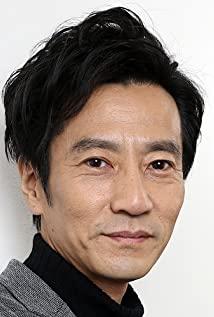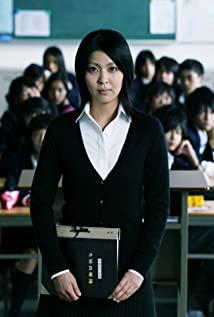As we all know, Japanese universities usually start in April in spring, and April is the time when Japanese cherry blossoms are flying all over the sky. Shunji Iwai's "April Story" is about the girl's mind in this season.
The film is the result of careful placement from start to finish. Although the title of the film is "April Story", the film has specially designed the heroine Yuzuki Uzuki, played by Takako Matsuko, to be from the cold Hokkaido, and deliberately set the main perspective of the first act as the first person. Families, still wrapped in heavy winter coats, saw them off. In April, Hokkaido was still freezing cold, and Uzuki got on the train bound for spring at this time and headed to Tokyo.
The "cold" at the beginning is part of the heroine's character and one of the elements of the plot. Perhaps it shouldn't be called cold, but a touch of clumsiness in self-reliance. This is clearly portrayed in the moving paragraph at the beginning: Uzuki rolled up her sleeves and tried to help the movers with fighting spirit, but she could hardly help, and even accidentally brought too much furniture and stuffed the living room. There was almost no place to stand, and finally, at the suggestion of the workers, the workers were half-shoved and let the workers take some furniture away.
Greeting and giving gifts to neighbors and introducing herself to the club were also awkward at first. She tried to be generous, even directly describing herself as cheerful, but she was actually still cautious and hesitantly hesitated.
On the one hand, Uzuki left her hometown and finally started a life alone in Tokyo. On the other hand, she was also a young girl who had just stepped into a university campus. She had traveled thousands of miles from her hometown Hokkaido to the capital Tokyo. Everything was new and naturally. Everything is also a challenge. Yuye Maoyue is a flower from the northern country, and the flower bones are still cold.
Slowly, more seemingly unrelated narratives appeared in the film: stopped to enjoy the singing of the campus band, entered and exited the bookstore Musashino Hall, repeatedly asked the clerk's working hours, watched the black and white movie "Oda Nobunaga", and was suspected of being a perverted man. Frightened and fleeing... These paragraphs did not have a particularly clear and coherent plot logic until the last 20 minutes of the film, until the flashback of the shady cutscenes behind the aerial shots of the club activities, and the whole truth of everything was slowly blurred.
It turned out that Uzuki had a crush on a senior named Yamazaki in high school. The senior was admitted to Musashino University, a university in Tokyo, so she secretly made this university her choice. But getting into Musashino University was not easy for a girl with average grades like Uzuki. So she studied with a sense of ritual, stole the business card from the senior's locker, and held the novel "Musashino" by Tobu Kunikida, which she could not read... Everything was in the name of "secret love". Fortunately, she was finally admitted to the same university, which was called "miracle of love" by Yuyue Yuzuki.
This flashback was carried out in Uzuki's monologue. Interestingly, the simple and unadorned piano melody is also endowed with a protagonist-like identity here, and the sound of the same period is intentionally covered; even the lighting is specially made into mirror reflection, and it hits the "Musashino" in dots and strips. On the cover, on Uzuki's arms, and on her face, it shone brightly. This fully expresses Uzuki's psychological activities when recalling in the language of the lens. After all, as a director of music videos, Shunji Iwai knows how to deal with different time, space and psychology. Under this performance, the flower of the Northland stretched out in the spring breeze.
After the spring breeze-like memories, the film enters the last paragraph, which is also the paragraph that finally sublimates the "miracle of love". Uzuki came to the bookstore where Yamazaki worked as a part-timer again, and was finally recognized by the senior as an alumni. The butterfly wings in her heart fanned out countless hurricanes. It just so happened that the sky was beautiful and the rain poured down, which triggered the scene of borrowing an umbrella. Mentioned above, Maoyue stopped to enjoy the band singing, went in and out of the bookstore, and watched black-and-white movies, all of which were the foreshadowing of memories and "squatting" secret crush on Yamazaki, and all of them were automatically unraveled here. At the end, the heavy rain, the red umbrella, and the cheerful Uzuki are connected in series. While finishing the image of Uzuki, it also wrote an unfinished rest for her April story.
Some people think that this ending came to an abrupt end and was not finished. This idea is actually quite typical. Or it should be pointed out that if "April Story" is regarded as a simple "secret love story", then the desire for the secret love narrative will not be satisfied, and the ending will inevitably be considered unfinished.
Secret love is only the surface of "April Story". It presents an undercurrent in the narrative, requiring the audience to connect and decipher, which is very different from the intuition, elaboration and even tearjerking that Japanese pure love has always been keen on. In fact, "April Story" should be understood as a girl's growth from passive to active, and secret love is the medicine for her growth.
The bridge section of the borrowed umbrella can fully illustrate this point. Uzuki, who was trapped in the rain, borrowed the old gentleman's umbrella and went back to the bookstore to ask the senior to borrow an umbrella. This action itself was a breakthrough in Uzuki's psychology. When the senior took out a bunch of umbrellas left by the guests for Uzuki to choose, Uzuki picked out a big red umbrella and said, "That...this one"; after opening it, the senior found that the umbrella was broken and reopened it by himself There are several umbrellas, but they are all broken or too fancy. At this time, Uzuki shook her head and said with a vigorous smile, "That's it!" This detail, which was greatly appreciated by Hirokazu Koreeda, inadvertently revealed that Uzuki had changed from being embarrassed and afraid to say more about everything to being resolute and decisive. Candid transformation. The red umbrella in the rain is the symbol of Maoyue who is excited and emotionally free at this moment.
Audiences who are familiar with Takashi Matsuko's background may know that "April Story" is actually a birthday present from Matsumoto's father, Kotaro Matsumoto, and the funding for the filming comes from his father's support. "April Story" is Matsuko's screen debut. It can even be said that Matsuko's acting career has been paved with influence as the father of a well-known Kabuki actor since his debut. At the station at the beginning of the film to see off, the group of people in the main perspective are also the real family members of Song Takako.
In other words, "April Story" was actually a father's commission to celebrate his daughter's coming of age (Matsutakako was just 20 at the time). As a proposition, what Shunji Iwai needs to show is actually a father's reluctance and expectation that his daughter will soon be separated from his wings. In terms of the embodiment of the script, it has become the daily life of a college student who goes all the way to the south in pursuit of a crush and lives alone in Tokyo.
The film unreservedly used the photo of Song Takako holding a signboard as a poster, and let Song Takako arrange the piano part of the soundtrack, which is also a footnote to the film as a commission. Twenty years have passed since "April Story", and Song Takako has made great achievements in the later works such as "Long Vacation", "Century of Love", "Confession", "Quartet" and even personal piano albums. Her achievements are obvious to all.
The song "Sakura", which fully embodies the tonality of traditional Japanese music, begins like this: "さくらさくら Yayoi no empty は" (cherry blossoms, cherry blossoms, in the sky in late spring in March). Like my country, the Japanese also named the twelve months with unique poetic names, among which March is the "Yayoi Moon", also known as "Miyue", and the vegetation is getting richer. And April just has the alias of "Maoyue".
Therefore, April is not the actual month, but the heroine Uzuki. In other words, rather than saying that "April Story" is a "story that happened in April", it is better to say that it is a "story of April". It is also from this perspective that what the film really tries to present is Matsumoto Koshiro's deepest expectation for Matsumoto Takako - the middle-aged male image echoing from beginning to end is also the manifestation of this intention and expectation - a girl who is far away from home. , travels to Tokyo to live alone, and gradually changes from passive to active growth story.
The flower of the Northland swayed in full bloom in the spring rain in Tokyo.
-----
The original text was published in the WeChat public account of "Iris" 20180928
View more about April Story reviews


